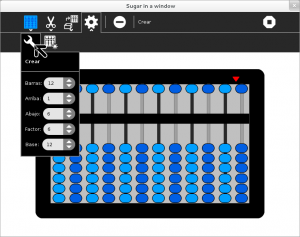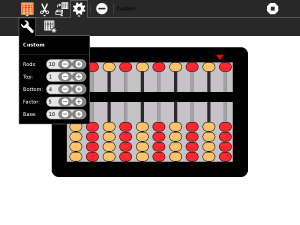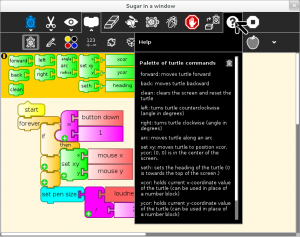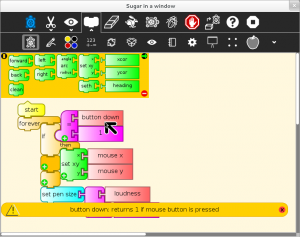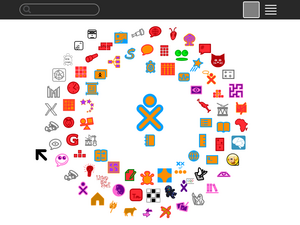User:Walter: Difference between revisions
No edit summary |
Tag: visualeditor-switched |
||
| (129 intermediate revisions by 11 users not shown) | |||
| Line 1: | Line 1: | ||
== Sugar 2020-2020 == | |||
2020 has been a challenge for everyone and Sugar Labs has not been spared some of consequences of a global pandemic. We have a skeleton set of developer/maintainers and have had little opportunity for outreach either to expand our community or the community of our users. I remain passionate about Sugar, but we missed some important opportunities over the years that would have led to mass adoption rather than niche use. For example, being forestalled in working with Nokia -- they were trying to position us as an alternative to Android. In large part OLPC kept Sugar Labs at arms length from their deployments -- hence we had very little direct contact with our end users -- with some exceptions, e.g., Paraguay Educa -- which is still active. Our involvement has been maintenance, which I think confirms the analysis of James (See http://lists.sugarlabs.org/archive/sugar-devel/2020-October/058708.html). | |||
That said, even though it is a bit long in tooth, I think Sugar is still an important expression of many ideas that have yet to find their way into the mainstream and can and should be used as a way to promote these ideas -- whether or not they are ultimately realized in Sugar deployments. The Journal/portfolio, the collaboration model, our approach to FOSS -- providing scaffolding to exercise one's freedoms, and more. | |||
And some of the Sugar activities are still quite viable and are seeing a new life -- either rewritten for Sugarizer or repackaged in Flatpak, where they are then available on any GNU/Linux desktop. | |||
Several topics James did not mention: | |||
The bulk of my personal contributions over the past 5-6 years have been to Music Blocks, one of the most active Sugar Labs repos. I focus there in part because I wanted to have my efforts reach a wider audience -- anyone with access to a browser can use it. (Like Sugarizer, it is also available in the Google Play Store, and in Flatpak. Ironically, it does not work inside Sugar itself at the moment.) But there are several other reasons. Since "you cannot think about thinking without thinking about thinking about something", I wanted to work on a "microworld" that was about something and I had long wanted to scratch a particular itch: music. I seized the opportunity when I met Devin and it has been a vehicle for lots of personal learning. As a stand-alone activity Music Blocks is getting a lot of traction -- including wide-spread adoption in Japan and Peru. And we have 100+ contributors -- new ones popping up all the time. But Devin and I also have another agenda. We think that Music Blocks could provide a vehicle for musicians to expand their repertoires into programming and hence expand their job prospects -- most musicians moonlight and why not moonlight teaching music through the lens of computation? We've also been developing a body of collateral material in support of this goal -- largely in the form of lesson plans. | |||
Finally, I still think of Sugar Labs as a place where people can come to learn. We've been very active in programs such as Google Summer of Code and Google Code-in (alas no more). And while some of the participants have stuck around, almost all of them have learned something along the way -- about programming, about FOSS, about engaging a community, about pedagogy, etc. Supporting Sugar Labs as a place of learning motivates me. | |||
My goals for 2020-2020: | |||
* I remain convinced that Sugar would be a great environment for the platforms like RPi, especially if we develop/support some activities that more directly support the Maker community: the Maker community would seemingly have a natural affinity towards Constructionism and FOSS. We need to research what are the essential tools to that community and make sure that we support them. We also need to demonstrate that some existing Sugar tools are quite powerful out of the box. For example, Josh Burker's work (See http://joshburker.blogspot.com/2015/05/turtle-blocks-and-3d-printing.html) was done with Turtle Art. | |||
* Less obvious perhaps is the home-schooling community, which has grown during the pandemic. Parents are desperate for new approaches and Sugar could offer one. We need to think about how to package Sugar for home-schoolers, including recommendations for how to use Sugar for learning, something that we seem to have often left to others. With that in mind, maybe we could team up with a local education program (I have one in mind) to get them to help us develop some collateral. | |||
* One of the great pleasures of working within the Sugar community over the past ~10 years has been Google Code in. Since Google has decided to end that program, I would like to find a way to do something similar to engage secondary school students in our community. Of course it cannot start off at the same scale as GCI, but I am sure we could plant a seed that can grow. Some other FOSS projects have also expressed interest. | |||
* Marketing. Marketing. Marketing. I am certain that if we have users we will be able to sustain a developer community. I have some ideas around marketing Sugar and there are undoubtedly better ideas in the community we should surface. One "idealet" is to distribute Sugar on a Stick to every member of the FSF. I am working with Ruben Rodriguez (CTO of the FSF) on putting Trisquel TOAST -- the latest version of Trisquel with the latest Sugar bits -- onto USB sticks which will be distributed in an upcoming FSF mailing. Just one idea among many. | |||
== Sugar 2019-2021 == | |||
In order to rebalance the board seat cycle -- our guidelines are to have 3 seats open every other year and 4 seats open in the off-cycle -- currently we are 2 and 5 -- I will vacate my oversight-board position by stepping down from the second year of my two-year appointment. I will run again in the next election cycle as it is too late to enter this cycle. | |||
My vision statement would be only slightly different that it was last time in that I am convinced that we still have a lot to offer as an organization. The circumstances have changed in that we are in the process of leaving the Software Freedom Conservancy, which means the board will have additional fiscal and oversight responsibilities. | |||
== Sugar 2020 == | |||
I've just reread my [[#Sugar Stable/Sugar Future|vision statement]] from 2 years ago and find it still relevant, although rather than a bifurcation, we have a trifrucation of effort: we still have multiple communities using the Sugar Desktop; we have some pilot programs emerging around Sugarizer, and we have a rapidly growing program in Music Blocks, which can run independently of either the desktop or Sugarizer. A professional curriculum for Music Blocks is being developed and the government of Japan is incorporating it into the primary-school curriculum. The latter effort has consumed the majority of my attention over the past two years as a developer and has been personally very rewarding. I am especially pleased that a team of educators has dedicated time and energy into ensuring that the tools are well matched to the needs of the schools – I anticipate that Music Blocks will be a big growth area for Sugar Labs and one we can point to as evidence of the value of our Constructionist approach to learning. | |||
My other efforts have been administer the Google Code-in and Google Summer of Code programs on behalf of Sugar Labs to leverage great work from new contributors, many of whom have become mentors for future contributors. (For example, Music Blocks has had more than 60 unique contributors.) It is largely this opportunity to work with bright young minds from around the world that keeps me excited about Sugar Labs and its mission. I also need to tip my hat to James Cameron, without whose efforts (and those of the developers he patiently supports), the Sugar Desktop would have atrophied by now. James works diligently to ensure that Sugar lives up to the standards of an open libre project with discipline sufficient to ensure a level of quality needed by our user community. | |||
That said, the past two years have been a personal struggle in regards to the Sugar Labs oversight board. It has been difficult to muster a quorum of board members even for our regularly scheduled one-hour monthly meetings. A disinterested, disengaged board has made it impossible to do any long term planning for Sugar Labs. I'm at an impasse: I have considered stepping down from the board since I feel it is so ineffective. As I outlined two years ago, we have lots of potential as an organization, but I have not been able to realize that potential unilaterally. I am disappointed that we have do so little to engage the Maker community, the existing Sugar communities, or take the time to discuss new opportunities. It all ultimately boils down to communication -- there has been none from the majority of my colleagues on the board. But having reflecting upon it, I have decided to run again for a seat on the oversight board, as I think I still have something to contribute to Sugar Labs. But I will not serve as chair of our meetings as I have not been effective in that role. I am hoping that the community will elect new members who will participate and the dead weight that prevents us from moving forward will be jettisoned. Together, we have much to accomplish. | |||
== Sugar Stable/Sugar Future == | |||
Sugar Labs has been pulled in two directions the past few years. On the one hand, it is getting much more stable, much more robust, and easier to maintain. The maintenance itself is being provided in large part by a dedicated group of youths and a small handful of professional developers. On the other hand, the world of educational technology continues to move in directions that make it more difficult for the typical individual or school to adopt Sugar as their core platform. While OLPC still stands behind Sugar -- indeed, FZT has launched a program for Sugar development at a university in Managua, the growth potential outside of OLPC for a GNU/Linux-based platform is smaller than it was a few years ago. I do think that the "tablet" meme has been discredited and increasing momentum behind the Maker movement has shifted things somewhat in our favor. We need to be aggressive in reaching out to potential new user communities. At the same time, it is also clear that mobile devices and the Web are going to be the predominant points of access to technology for much of the world, so we are also obliged to try to bring some of our ideas (if not our entire platform) to those worlds. We have some momentum there as well, with the Sugarizer platform and the various JavaScript initiatives underway, e.g., [http://walterbender.github.io/musicblocks Music Blocks]. I don't see any way to avoid splitting our efforts between these two worlds -- GNU/Linux desktop and Web/native Android. Not ideal, but we have things to contribute to both worlds and an opportunity to learn and grow as a community going forward. | |||
As a member of the Sugar community, I have been active as: (1) a [http://github.com/walterbender developer] -- more on the activity side than the platform side; (2) a liaison to the SFC; (3) the coordinator for both [[Summer_of_Code/2015|Google Summer of Code]] and [[Google_Code_In_2015|Google Code In]]; (4) promoting Sugar within academic circles -- most recently a [[File:MusicBlocks-Constructionism-2016.pdf|paper]] that Devin, Yash, and I wrote for the Constructionist 2016 conference on the work we did together during GSoC; (5) raising funds for internationalization and workshops; and (6) running the monthly SLOB meetings. I don't need to be a member of the oversight board in order to be a developer, but for the other activities, it is important to have a voice within the community. If I am returned to the board, I hope to hand off responsibility for running meeting to another board member. And the role of liaison to the SFC. I think continuity within the Google programs is important, and I plan to continue in that sphere. I will also continue to manage the Trip Advisor grant, which has been really helpful for outreach -- most recently I was able to get some new [https://github.com/walterbender/turtleblocksjs/blob/master/po/ar.po Arabic] translations done and we are making great inroads in places like Jamaica through that grant. | |||
One final note: I am in the process of launching a new college for industrial design. I am instilling Free/Libre Software as a core principle of the college and I hope to be able to make Sugar be at the core of the educational technology section of the school. More on that effort soon. | |||
==Walter Bender== | ==Walter Bender== | ||
I was at OLPC for several years and now I am a volunteer on the project. My home page can be found here: [http://www.media.mit.edu/~walter] | I was at OLPC for several years and now I am a volunteer on the project. My home page can be found here: [http://www.media.mit.edu/~walter] | ||
=== | Email: walter AT sugarlabs DOT org | ||
* get Frame test set up in Peru/Uruguay/Paraguay | |||
* New Activity templates | === bio === | ||
:Much of the information that is consistent across activities can be held in activities.s.o. ([[User:Dfarning|dfarning]] 22:28, 16 June 2008 (UTC)) | Walter Bender is founder of Sugar Labs, which develops educational software used by more than three-million children in more than forty countries. Sugar Labs is a member project of the non-profit foundation Software Freedom Conservancy. In 2006, Bender co-founded the One Laptop per Child, a non-profit association with Nicholas Negroponte and Seymour Papert. As director of the MIT Media Laboratory from 2000 to 2006, Bender led a team of researchers in fields as varied as tangible media to affective computing to lifelong kindergarten. In 1992, Bender founded the MIT News in the Future consortium, which launched the era of digital news. Currently, he is launching a new initiative at MIT, the Open Learning Program, a forum for collaborative research among universities globally. | ||
Bender received his undergraduate degree from Harvard University in 1977 and a masters degree from MIT in 1980, where he built the Electronic Publishing research group. He was a founding member of the MIT Media Lab, where he was a Senior Scientist and holder of the Alexander W Dreyfoos Chair. | |||
Bender serves or has served on numerous boards and committees, including IBM's mobile computing advisory board and the GNOME technical advisory board. He is on the advisory board of the Squeak Foundation, the Center for Educational Technology (CET) in Israel, and Libre Corps, a new program at RIT that builds long-term, on-going relationships between university students and humanitarian organizations. He has held visiting faculty appointments at international universities, including the University of Tampere, and continues to serve on university research advisory boards and on occasion teaches at Hult and MIT Sloan business schools. Bender's book, ''Leaning to Change the World'', on technology. learning, and social entrepreneurship was published in 2012. | |||
=== bio en es === | |||
<small>'''Nota:''' ''Walter tiene una biografia en la Wikipedia en español, la misma es [https://es.wikipedia.org/wiki/Walter_Bender esta]''</small> | |||
Walter Bender es el director de la Fundación Sugar Lab, una organización sin fines de lucro, desde donde ha diseñado el sistema operativo SUGAR que utilizan las computadoras XO de la organización OLPC (One Laptop per Child) Una Computadora por estudiante. Uno de los objetivos de Sugar Lab es ofrecer un espacio de reunión y apoyo para una creciente comunidad de educadores y desarrolladores de software que quieran extender la plataforma de Sugar y quienes han estado creando aplicaciones compatibles con esta. Antes de fundar el Sugar Lab, Walter fue parte de la organización OLPC todavía apoya los esfuerzos de esa organización en el desarrollo y diseminación de tecnologías que puedan revolucionar el mundo de los niños y niñas y los atraigan hacia el aprendizaje. Entre los años 2000 y 2006 Walter fue el Director Ejecutivo del Laboratorio de Medios Media Lab, del Instituto Tecnológico de Massachusetts MIT donde además, por muchos años dirigió el grupo de investigación llamado Las Noticias de Futuro que se fundó en 1996 y su proyecto Publicación Electrónica. En el marco de las investigaciones Publicación Electrónica Walter ayudó a desarrollar en el siglo pasado las herramientas tecnológicas para promover lo que hoy en el siglo XXI conocemos como periodismo ciudadano. | |||
Walter tiene dos experiencias realmente pioneras relacionados con el periodismo ciudadano. | |||
Una se llama los Silver Stringers o Periodistas de Plata, que reúne a un grupo de personas de la tercera edad de la comunidad de Melrose en Massachusetts que publican su periódico sistemáticamente para lo cual siguen el proceso que se lleva a cabo en los grandes medios de comunicación masivo. Para esta experiencia, Walter contó con el apoyo de Jack Driscoll, Editor Pensionado del diario The Boston Globe. Es interesante mencionar que una de las ediciones de Silver Stringers en el año 2001 estuvo dedicada a Costa Rica, cuando algunos de los vecinos de Melrose vinieron de vacaciones a nuestro país y reportaron en el periódico The Silver Stringers o los Periodistas de Plata sobre sus aventuras aquí. | |||
La otra experiencia es el Junior Journal o el Diario Joven, que iniciando 1998 reunió a 300 jóvenes, niños y niñas entre los 13 y los 18 años, viviendo en muchos países alrededor del mundo para, en aquella época (pre web y pre redes sociales) escribir artículos de interés nacional, regional y mundial, editarlos y publicarlos mensualmente en su periódico. Otras experiencias semejantes con niños, niñas y jóvenes incluyen La Fragola en Italia que a la fecha cuenta con 7400 periódicos escolares y colegiales en línea. | |||
Desde todas estas perspectivas Walter ha hecho una importante contribución al conocimiento en las áreas de publicación electrónica, medios digitales y tecnologías para aprender. | |||
http://static.fsf.org/nosvn/associate/fsf-9844.png | |||
===Regarding the Sugar Labs Oversight Board=== | |||
I am in deep. I live and breath Sugar every moment of every day. Perhaps too much (Mentoring students in Google Code In doesn't help the situation any). But I really do think that Sugar is of great value to learners and, although we are swimming against the tide of the mainstream (learning as consumption), we have had and continue to have a positive influence. | |||
I've spent much of the past two years advocating on behalf of Sugar (I've literally traveled the world to speak about Sugar). The good thing is that being captive in an airplane is a great place to write code. When I speak about Sugar, I use Sugar: i.e., every talk I have given in the past 5 years has been written in Turtle Art. | |||
Of late, I have also been working on raising money towards specific goals. Most recently, with help from Chris and Claudia, I got a grant for Sugar Labs from Trip Advisor to support our localization efforts and our efforts to promote programming by children (See turtleartday.org). I plan to do more targeted fund-raising over the next two years as the needs of our community come more sharply into focus. At the same time, I have been working hard (with Gonzalo and Tincho) to help local deployments fill in some of the development gaps left by the dispersal of the OLPC engineering team. Finally, I am working on developing a new program at MIT to rally universities around Sugar as a research and development platform. All of these efforts are enhanced by my role as a member of the Sugar Labs oversight board. Having an "official" role in the organization gives me more clout with potential donors and collaborators. | |||
My colleagues on the oversight board and in the general community are the best. Thank you for your contributions to the project. | |||
==== 2011 ==== | |||
Follow this link to my [[User:Walter/2011_position_statement|2009 Position Statement]]. | |||
Two years ago, I said: | |||
While it has been my goal to help get Sugar Labs to a point of self-sustainability, I don't think we are yet at that point. My goals for 2010 are to focus on fund-raising and further refining the organizational and governance models. | |||
:I think we made lots of progress re structure and not much progress fund-raising. | |||
A bit about me and my role in Sugar Labs: I was part of the Sugar team at One Laptop per Child that left to found Sugar Labs in March of 2008. I have worn a few different hats within the organization: activity developer, occasional contributor to Sugar core, member of the deployment team, the marketing team, and the activity team. I was a lead author of the FLOSS Manual on Sugar. I am presently the executive director of Sugar Labs. I also represent Sugar on the GNOME technical advisory board and the Squeakland board. I have been a GSOC mentor and am participating in several pilot deployment projects of Sugar on a Stick. | |||
:This is much the same... although I am perhaps coding more now than ever. | |||
===LibrePlanet 2016=== | |||
[[File:Education-needs-free-software.pdf]] | |||
===OWF talk=== | |||
[[File:OWF2010 talk.odp]] | |||
===Pakistan talk=== | |||
[[File:Pakitsan.odp]] [http://streaming.hec.gov.pk/tcs/?id=518D8114-D187-4755-8919-A09267E03716 video] | |||
===CLEI talk=== | |||
[[File:CLEI.odp]](es) [http://www.youtube.com/watch?v=Ic7OWgtP0jc video](es y en) | |||
===Libre Planet talk=== | |||
<gallery> | |||
File:Libreplanet2.png | |||
File:Libreplanet3.png | |||
File:Libreplanet4.png | |||
File:Libreplanet5.png | |||
File:Libreplanet6.png | |||
File:Libreplanet7.png | |||
File:Libreplanet8.png | |||
File:Libreplanet9.png | |||
File:Libreplanet10.png | |||
File:Libreplanet11.png | |||
File:Libreplanet12.png | |||
File:Libreplanet13.png | |||
File:Libreplanet14.png | |||
File:Libreplanet15.png | |||
File:Libreplanet16.png | |||
File:Libreplanet17.png | |||
File:Libreplanet18.png | |||
File:Libreplanet19.png | |||
File:Libreplanet20.png | |||
File:Libreplanet21.png | |||
File:Libreplanet22.png | |||
File:Libreplanet23.png | |||
File:Libreplanet24.png | |||
File:Libreplanet25.png | |||
File:Libreplanet26.png | |||
</gallery> | |||
===To do=== | |||
* Write up new feature requests for 0.96: | |||
** Activity-mounted volumes in the Journal | |||
** Audio notes in the Journal | |||
** Lower-right hover to invoke/dismiss frame | |||
* Write Journal thumbnail viewer activity | |||
** shows title, preview, and description in scrollable window | |||
* <strike>get Frame test set up in Peru/Uruguay/Paraguay</srike> | |||
* <strike>New Activity templates | |||
:Much of the information that is consistent across activities can be held in activities.s.o. ([[User:Dfarning|dfarning]] 22:28, 16 June 2008 (UTC))</strike> | |||
* Follow-up with Linux Foundation | * Follow-up with Linux Foundation | ||
* | * <strike>Draft membership agreement for Sugar Labs</strike> | ||
* <strike>rebase Turtle Art on SVG</strike> | |||
* <strike>ask SFC for pointers to lawyers in SA</strike> | |||
* <strike>start writing NSF/USAID proposal</strike> | |||
* <strike>local-labs proposals</strike> | |||
* <strike>NSF Creativity grant</strike> | |||
* <strike>Babson brief</strike> | |||
* Watertown follow-up | |||
* Curriculum guides from GPA programs | |||
===Done=== | ===Done=== | ||
* New Getting Started Guide (See [http://flossmanuals.net/Sugar The Sugar FLOSS Manual] | * New Getting Started Guide (See [http://flossmanuals.net/Sugar The Sugar FLOSS Manual]) | ||
* Add ParserFunctions to Sugar Labs mediawiki | * Add ParserFunctions to Sugar Labs mediawiki | ||
* Draft rules of [[Sugar Labs/Governance|governance for Sugar Labs]] | * Draft rules of [[Sugar Labs/Governance|governance for Sugar Labs]] | ||
* Start [http://lists.sugarlabs.org/pipermail/community-news/ Community-News Sugar Weekly Digest] list | * Start [http://lists.sugarlabs.org/pipermail/community-news/ Community-News Sugar Weekly Digest] list | ||
* CoSN proposal | |||
* rebase Gmail on new Browse | |||
* Finalize arrangements with SFC | |||
** Incorporate Sugar Labs | |||
===Recent writing about Sugar and learning=== | ===Recent writing about Sugar and learning=== | ||
* [http://www.linux-magazine.es/issue/54/078-083_SugarLM54.pdf Sugar (Linux Magazine ES)] | |||
* [http://www.olpcnews.com/software/sugar/confessions_of_a_fundamentalist.html Confessions of a fundamentalist (Part 1)] | * [http://www.olpcnews.com/software/sugar/confessions_of_a_fundamentalist.html Confessions of a fundamentalist (Part 1)] | ||
* [http://www.olpcnews.com/software/sugar/more_fundamentalist_confessions.html Confessions of a fundamentalist (Part 2)] | * [http://www.olpcnews.com/software/sugar/more_fundamentalist_confessions.html Confessions of a fundamentalist (Part 2)] | ||
* [http://walterbender.org/?p=6 A page from the Hilbert playbook] | * [http://walterbender.org/?p=6 A page from the Hilbert playbook] | ||
* [http://walterbender.org/?p=30 Media, Mathematics, and Mallard Fillmore] | |||
(I also [http://walterbender.org blog] the weekly Sugar Digest.) | (I also [http://walterbender.org blog] the weekly Sugar Digest.) | ||
The slides from a talk I gave about Sugar at the Women2Woman conference are [[:Image:Women2women-part1.odp|here]] and [[:Image:Women2women-part2.odp|here]]. | |||
===Sandbox=== | ===Sandbox=== | ||
====Spinner palette gtk-2==== | |||
[[File:Abacus-spinner-palette.png|300px]] | |||
====Spinner palette gtk-3==== | |||
[[File:Abacus-spinner-palette-3.png|300px]] | |||
====Sound test==== | |||
[[User:Walter/Get Sugar]] [[File:Test.ogg|test sound]] | |||
====Help palette==== | |||
[[File:TurtleArtHelp.png|300px]] | |||
[[File:TurtleArtHoverHelp.png|300px]] | |||
====Home View==== | |||
A new, tighter spiral for the Home View: | |||
[[File:Spiral-home-view.png|300px]] | |||
<code> | |||
class MyLayout(RingLayout): | |||
"""Spiral layout based on Archimedean spiral: r = a + b*theta.""" | |||
__gtype_name__ = 'MyLayout' | |||
icon_name = 'view-mylayout' | |||
"""Name of icon used in home view dropdown palette.""" | |||
profile_key = 'my-layout' | |||
"""String used in profile to represent this view.""" | |||
def __init__(self): | |||
RingLayout.__init__(self) | |||
self.my_radius = _MINIMUM_RADIUS | |||
self.my_orientation = math.pi | |||
def _calculate_radius_and_icon_size(self, children_count): | |||
"""Stub out this method; not used in `My Layout`.""" | |||
return _MINIMUM_RADIUS, style.STANDARD_ICON_SIZE | |||
def _calculate_position(self, radius, icon_size, index, children_count): | |||
""" Increment the radius as you go """ | |||
if index == 0: | |||
self.my_radius = _MINIMUM_RADIUS | |||
self.my_orientation = math.pi | |||
x, y = self._calculate_xy() | |||
# add some buffering around the icon | |||
self._calculate_new_radius_orientation(icon_size + 10) | |||
width, height = self.box.get_allocation() | |||
return int(x) + (width - icon_size) / 2, \ | |||
int(y) + (height - icon_size - (style.GRID_CELL_SIZE / 2) ) / 2 | |||
def _calculate_xy(self): | |||
""" Convert r, o to x, y """ | |||
return -math.sin(self.my_orientation) * self.my_radius, \ | |||
math.cos(self.my_orientation) * self.my_radius | |||
def _calculate_new_radius_orientation(self, icon_size): | |||
""" Based upon current radius, calculate new increments """ | |||
circumference = self.my_radius * 2 * math.pi | |||
n = circumference / icon_size | |||
self.my_orientation += 2 * math.pi / n | |||
self.my_radius += float(icon_size) / n | |||
</code> | |||
This version inherits from RandomLayout and lets you rearrange the icons. | |||
<code> | |||
class MyLayout(RandomLayout): | |||
"""Spiral layout based on Archimedean spiral: r = a + b*theta.""" | |||
__gtype_name__ = 'MyLayout' | |||
icon_name = 'view-mylayout' | |||
"""Name of icon used in home view dropdown palette.""" | |||
profile_key = 'my-layout' | |||
"""String used in profile to represent this view.""" | |||
def __init__(self): | |||
RandomLayout.__init__(self) | |||
self.my_radius = _MINIMUM_RADIUS | |||
self.my_orientation = math.pi | |||
def _calculate_radius_and_icon_size(self, children_count): | |||
"""Stub out this method; not used in `My Layout`.""" | |||
return _MINIMUM_RADIUS, style.STANDARD_ICON_SIZE | |||
def _calculate_position(self, icon_size): | |||
""" Increment the radius as you go """ | |||
x, y = self._calculate_xy() | |||
# add some buffering around the icon | |||
self._calculate_new_radius_orientation(icon_size + 10) | |||
width, height = self.box.get_allocation() | |||
return int(x) + (width - icon_size) / 2, \ | |||
int(y) + (height - icon_size - (style.GRID_CELL_SIZE / 2) ) / 2 | |||
def _calculate_xy(self): | |||
""" Convert r, o to x, y """ | |||
return -math.sin(self.my_orientation) * self.my_radius, \ | |||
math.cos(self.my_orientation) * self.my_radius | |||
def _calculate_new_radius_orientation(self, icon_size): | |||
""" Based upon current radius, calculate new increments """ | |||
circumference = self.my_radius * 2 * math.pi | |||
n = circumference / icon_size | |||
self.my_orientation += 2 * math.pi / n | |||
self.my_radius += float(icon_size) / n | |||
def append(self, icon, locked=False): | |||
""" Instead of assigning the position based on a hash, use spiral """ | |||
FavoritesLayout.append(self, icon, locked) | |||
min_width_, child_width = icon.get_width_request() | |||
min_height_, child_height = icon.get_height_request(child_width) | |||
min_width_, width = self.box.get_width_request() | |||
min_height_, height = self.box.get_height_request(width) | |||
if icon in self.fixed_positions: | |||
x, y = self.fixed_positions[icon] | |||
x = min(x, width - child_width) | |||
y = min(y, height - child_height) | |||
else: | |||
x, y = self._calculate_position(child_width) | |||
if x is None or y is None: | |||
self._grid.add(icon, | |||
child_width / _CELL_SIZE, child_height / _CELL_SIZE) | |||
else: | |||
self._grid.add(icon, | |||
child_width / _CELL_SIZE, child_height / _CELL_SIZE, | |||
x / _CELL_SIZE, y / _CELL_SIZE) | |||
</code> | |||
====Keyboards==== | |||
I used to design the keyboards for OLPC. I am doing one for them for a 'high-school' version of the XO-1.5. Here is a first pass: [[File:OLPC-1.5-es.svg|thumb|es]] [[File:OLPC-1.5-us.svg|thumb|us]] | |||
====Misc.==== | |||
* [[2010 DML proposal]] | |||
* [[File:VisualMatch-18.xo]] | |||
* [[User:Walter/sandbox]] | * [[User:Walter/sandbox]] | ||
* [[User:Walter/favoriteslayout.py]] Obsolete | |||
* [[User:Walter/favoritesview.py]] Obsolete | |||
* [[User:Walter/View-mylayout.svg]] | |||
* [[Activities/Turtle Art/Patching]] Obsolete | |||
[[Image:Spiral.png|thumb|left|Spiral Home View]] | |||
[[Image:FermatSpiral.png|thumb|left|Fermat Spiral]] | |||
[[Image:Pythagorus.png|thumb|left|Modifying TurtleArt]] | |||
<div class="visualClear"></div> | |||
====Floss Manual==== | |||
<div> | |||
<img src="http://en.flossmanuals.net/bookstore/bookstore.gif"/> | |||
<style> | |||
@import url("http://en.flossmanuals.net/bookstore/bookstore.css"); | |||
</style> | |||
<script src="http://en.flossmanuals.net/bookstore/bookstore.js" type="text/javascript"></script> | |||
<script type="text/javascript"> | |||
FM.init({"paging":true,"preferred":["OLPC LAPTOP USERS GUIDE","SUGAR USERS GUIDE"]}); | |||
</script> | |||
</div> | |||
====Portfolio==== | |||
I am making a "TurtleArt: inspired portfolio tool. See [[Activities/Turtle Art#Portfolios|TAPortfolio]] for more details. | |||
[[Image:TurtlePortfolio.png|thumb|left|first sketch of the portfolio tool]] | |||
[[Image:Portfolio2.png|thumb|left|another sketch of the portfolio tool]] | |||
[[Image:TAPortfolio.png|thumb|left|almost to Version 1.0]] | |||
[[Image:Clapper.png|thumb|left|clap to advance to next slide]] | |||
[[Image:Keyboardinput.png|thumb|left|type to advance to next slide]] | |||
<div class="visualClear"></div> | |||
====Turtle Art → Logo==== | |||
I added a "view source" for Turtle Art that exports Logo. | |||
[[Image:Taspin.png|thumb|left|a Turtle Art project]] | |||
[[Image:UCB-Logo.png|thumb|left|the UCB Logo version]] | |||
<div class="visualClear"></div> | |||
Some procedures for setting up the palette and the shade functionality: | |||
to tasetpalette :i :r :g :b :myshade | |||
make "s ((:myshade - 50) / 50) | |||
ifelse lessp :s 0 [ | |||
make "s (1 + (:s *0.8)) | |||
make "r (:r * :s) | |||
make "g (:g * :s) | |||
make "b (:b * :s) | |||
] [ | |||
make "s (:s * 0.9) | |||
make "r (:r + ((100-:r) * :s)) | |||
make "g (:g + ((100-:g) * :s)) | |||
make "b (:b + ((100-:b) * :s)) | |||
] | |||
setpalette :i (list :r :g :b) | |||
end | |||
to rgb :myi :mycolors :myshade | |||
make "myr first :mycolors | |||
make "mycolors butfirst :mycolors | |||
make "myg first :mycolors | |||
make "mycolors butfirst :mycolors | |||
make "myb first :mycolors | |||
make "mycolors butfirst :mycolors | |||
tasetpalette :myi :myr :myg :myb :myshade | |||
output :mycolors | |||
end | |||
to processcolor :mycolors :myshade | |||
if emptyp :mycolors [stop] | |||
make "i :i + 1 | |||
processcolor (rgb :i :mycolors :myshade) :myshade | |||
end | |||
to tasetshade :shade | |||
make "myshade modulo :shade 200 | |||
if greaterp :myshade 99 [make "myshade (199-:myshade)] | |||
make "i 7 | |||
make "mycolors :colors | |||
processcolor :mycolors :myshade | |||
end | |||
to tasetpencolor :c | |||
make "color modulo round :c 100 | |||
setpencolor :color + 8 | |||
end | |||
make "colors [ | |||
100 0 0 100 5 0 100 10 0 100 15 0 100 20 0 100 25 0 100 30 0 100 35 0 100 40 0 100 45 0 | |||
100 50 0 100 55 0 100 60 0 100 65 0 100 70 0 100 75 0 100 80 0 100 85 0 100 90 0 100 95 0 | |||
100 100 0 90 100 0 80 100 0 70 100 0 60 100 0 50 100 0 40 100 0 30 100 0 20 100 0 10 100 0 | |||
0 100 0 0 100 5 0 100 10 0 100 15 0 100 20 0 100 25 0 100 30 0 100 35 0 100 40 0 100 45 | |||
0 100 50 0 100 55 0 100 60 0 100 65 0 100 70 0 100 75 0 100 80 0 100 85 0 100 90 0 100 95 | |||
0 100 100 0 95 100 0 90 100 0 85 100 0 80 100 0 75 100 0 70 100 0 65 100 0 60 100 0 55 100 | |||
0 50 100 0 45 100 0 40 100 0 35 100 0 30 100 0 25 100 0 20 100 0 15 100 0 10 100 0 5 100 | |||
0 0 100 5 0 100 10 0 100 15 0 100 20 0 100 25 0 100 30 0 100 35 0 100 40 0 100 45 0 100 | |||
50 0 100 55 0 100 60 0 100 65 0 100 70 0 100 75 0 100 80 0 100 85 0 100 90 0 100 95 0 100 | |||
100 0 100 100 0 90 100 0 80 100 0 70 100 0 60 100 0 50 100 0 40 100 0 30 100 0 20 100 0 10] | |||
make "shade 50 | |||
tasetshade :shade | |||
to tasetbackground :color :shade | |||
tasetshade :shade | |||
setbackground :color + 8 | |||
end | |||
The project: | |||
to ta | |||
clearscreen tasetbackground 21 100 setpensize 25.0 make "box1 0.0 | |||
repeat 300.0 [ tasetpencolor xcor / 6.0 tasetshade heading forward :box1 right 91.0 make "box1 :box1 + 1.0 ] | |||
end | |||
ta | |||
====Turtle Art variables==== | |||
Following the lead of Luis Michelena, I've added named blocks and stacks. I plan to add push and pop next, which should greatly expand the range of possible constructions. | |||
[[Image:To square.png|thumb|left|to square]] | |||
[[Image:NewVariableGraphics.png|thumb|left|reworking the graphics]] | |||
<div class="visualClear"></div> | |||
====Turtle Art push and pop==== | |||
While it is not the intent that Turtle Art be a full implementation of Logo, but there has been some discussion on teh Sur list about adding some capability for passing arguments to stacks. (and to support recursion). I have added a FILO and push and pop blocks to enable this functionality. I am looking for feedback. regarding this choice. | |||
[[Image:Push and pop.png|thumb|left|push and pop]] | |||
<div class="visualClear"></div> | |||
====HBS-style analysis==== | |||
* our points of difference | |||
* our points of parity | |||
* their points of difference | |||
====Sugar icons==== | |||
{| | |||
|- | |||
|align=left width=1261| ||<imagemap> | |||
File:Sugar-artwork.png | |||
rect 0 0 84 66 [[User:Walter|'activity-start']] | |||
rect 84 0 168 66 [[User:Walter|'activity-stop']] | |||
rect 168 0 252 66 [[User:Walter|'cell-format']] | |||
rect 252 0 336 66 [[User:Walter|'cell-height']] | |||
rect 336 0 420 66 [[User:Walter|'cell-size']] | |||
rect 420 0 504 66 [[User:Walter|'cell-width']] | |||
rect 504 0 588 66 [[User:Walter|'column-insert']] | |||
rect 588 0 672 66 [[User:Walter|'column-remove']] | |||
rect 672 0 756 66 [[User:Walter|'dialog-cancel']] | |||
rect 756 0 840 66 [[User:Walter|'dialog-ok']] | |||
rect 840 0 924 66 [[User:Walter|'document-save']] | |||
rect 924 0 1008 66 [[User:Walter|'document-send']] | |||
rect 1008 0 1092 66 [[User:Walter|'edit-copy']] | |||
rect 1092 0 1176 66 [[User:Walter|'edit-delete']] | |||
rect 1176 0 1260 66 [[User:Walter|'edit-paste']] | |||
rect 0 66 84 132 [[User:Walter|'edit-redo']] | |||
rect 84 66 168 132 [[User:Walter|'edit-undo']] | |||
rect 168 66 252 132 [[User:Walter|'format-columns-double']] | |||
rect 252 66 336 132 [[User:Walter|'format-columns-single']] | |||
rect 336 66 420 132 [[User:Walter|'format-columns-triple']] | |||
rect 420 66 504 132 [[User:Walter|'format-justify-center']] | |||
rect 504 66 588 132 [[User:Walter|'format-justify-fill']] | |||
rect 588 66 672 132 [[User:Walter|'format-justify-left']] | |||
rect 672 66 756 132 [[User:Walter|'format-justify-right']] | |||
rect 756 66 840 132 [[User:Walter|'format-text-bold']] | |||
rect 840 66 924 132 [[User:Walter|'format-text-italic']] | |||
rect 924 66 1008 132 [[User:Walter|'format-text-leading']] | |||
rect 1008 66 1092 132 [[User:Walter|'format-text-size']] | |||
rect 1092 66 1176 132 [[User:Walter|'format-text-underline']] | |||
rect 1176 66 1260 132 [[User:Walter|'go-down']] | |||
rect 0 132 84 198 [[User:Walter|'go-home']] | |||
rect 84 132 168 198 [[User:Walter|'go-left']] | |||
rect 168 132 252 198 [[User:Walter|'go-next-paired']] | |||
rect 252 132 336 198 [[User:Walter|'go-next']] | |||
rect 336 132 420 198 [[User:Walter|'go-previous-paired']] | |||
rect 420 132 504 198 [[User:Walter|'go-previous']] | |||
rect 504 132 588 198 [[User:Walter|'go-right']] | |||
rect 588 132 672 198 [[User:Walter|'go-up']] | |||
rect 672 132 756 198 [[User:Walter|'insert-image']] | |||
rect 756 132 840 198 [[User:Walter|'insert-table']] | |||
rect 840 132 924 198 [[User:Walter|'invite']] | |||
rect 924 132 1008 198 [[User:Walter|'list-add']] | |||
rect 1008 132 1092 198 [[User:Walter|'list-remove']] | |||
rect 1092 132 1176 198 [[User:Walter|'media-eject-insensitive']] | |||
rect 1176 132 1260 198 [[User:Walter|'media-eject']] | |||
rect 0 198 84 264 [[User:Walter|'media-playback-pause-insensitive']] | |||
rect 84 198 168 264 [[User:Walter|'media-playback-pause']] | |||
rect 168 198 252 264 [[User:Walter|'media-playback-start-insensitive']] | |||
rect 252 198 336 264 [[User:Walter|'media-playback-start']] | |||
rect 336 198 420 264 [[User:Walter|'media-playback-stop-insensitive']] | |||
rect 420 198 504 264 [[User:Walter|'media-playback-stop']] | |||
rect 504 198 588 264 [[User:Walter|'media-playlist-repeat-insensitive']] | |||
rect 588 198 672 264 [[User:Walter|'media-playlist-repeat']] | |||
rect 672 198 756 264 [[User:Walter|'media-playlist-shuffle-insensitive']] | |||
rect 756 198 840 264 [[User:Walter|'media-playlist-shuffle']] | |||
rect 840 198 924 264 [[User:Walter|'media-record-insensitive']] | |||
rect 924 198 1008 264 [[User:Walter|'media-record']] | |||
rect 1008 198 1092 264 [[User:Walter|'media-seek-backward-insensitive']] | |||
rect 1092 198 1176 264 [[User:Walter|'media-seek-backward']] | |||
rect 1176 198 1260 264 [[User:Walter|'media-seek-forward-insensitive']] | |||
rect 0 264 84 330 [[User:Walter|'media-seek-forward']] | |||
rect 84 264 168 330 [[User:Walter|'row-insert']] | |||
rect 168 264 252 330 [[User:Walter|'row-remove']] | |||
rect 252 264 336 330 [[User:Walter|'system-logout']] | |||
rect 336 264 420 330 [[User:Walter|'system-restart']] | |||
rect 420 264 504 330 [[User:Walter|'system-search']] | |||
rect 504 264 588 330 [[User:Walter|'system-shutdown']] | |||
rect 588 264 672 330 [[User:Walter|'toolbar-colors']] | |||
rect 672 264 756 330 [[User:Walter|'toolbar-edit']] | |||
rect 756 264 840 330 [[User:Walter|'toolbar-view']] | |||
rect 840 264 924 330 [[User:Walter|'transfer-from-application-octet-stream']] | |||
rect 924 264 1008 330 [[User:Walter|'transfer-from-audio-x-generic']] | |||
rect 1008 264 1092 330 [[User:Walter|'transfer-from-image-x-generic']] | |||
rect 1092 264 1176 330 [[User:Walter|'transfer-from']] | |||
rect 1176 264 1260 330 [[User:Walter|'transfer-from-text-uri-list']] | |||
rect 0 330 84 396 [[User:Walter|'transfer-from-text-x-generic']] | |||
rect 84 330 168 396 [[User:Walter|'transfer-from-video-x-generic']] | |||
rect 168 330 252 396 [[User:Walter|'transfer-to-application-octet-stream']] | |||
rect 252 330 336 396 [[User:Walter|'transfer-to-audio-x-generic']] | |||
rect 336 330 420 396 [[User:Walter|'transfer-to-image-x-generic']] | |||
rect 420 330 504 396 [[User:Walter|'transfer-to']] | |||
rect 504 330 588 396 [[User:Walter|'transfer-to-text-uri-list']] | |||
rect 588 330 672 396 [[User:Walter|'transfer-to-text-x-generic']] | |||
rect 672 330 756 396 [[User:Walter|'transfer-to-video-x-generic']] | |||
rect 756 330 840 396 [[User:Walter|'tray-hide']] | |||
rect 840 330 924 396 [[User:Walter|'tray-show']] | |||
rect 924 330 1008 396 [[User:Walter|'view-box']] | |||
rect 1008 330 1092 396 [[User:Walter|'view-created']] | |||
rect 1092 330 1176 396 [[User:Walter|'view-details']] | |||
rect 1176 330 1260 396 [[User:Walter|'view-freeform']] | |||
rect 0 396 84 462 [[User:Walter|'view-fullscreen']] | |||
rect 84 396 168 462 [[User:Walter|'view-lastedit']] | |||
rect 168 396 252 462 [[User:Walter|'view-list']] | |||
rect 252 396 336 462 [[User:Walter|'view-radial']] | |||
rect 336 396 420 462 [[User:Walter|'view-refresh']] | |||
rect 420 396 504 462 [[User:Walter|'view-return']] | |||
rect 504 396 588 462 [[User:Walter|'view-size']] | |||
rect 588 396 672 462 [[User:Walter|'view-source']] | |||
rect 672 396 756 462 [[User:Walter|'view-spiral']] | |||
rect 756 396 840 462 [[User:Walter|'view-triangle']] | |||
rect 840 396 924 462 [[User:Walter|'zoom-activity']] | |||
rect 924 396 1008 462 [[User:Walter|'zoom-best-fit']] | |||
rect 1008 396 1092 462 [[User:Walter|'zoom-groups']] | |||
rect 1092 396 1176 462 [[User:Walter|'zoom-home']] | |||
rect 1176 396 1260 462 [[User:Walter|'zoom-in']] | |||
rect 0 462 84 528 [[User:Walter|'zoom-neighborhood']] | |||
rect 84 462 168 528 [[User:Walter|'zoom-original']] | |||
rect 168 462 252 528 [[User:Walter|'zoom-out']] | |||
desc none | |||
</imagemap> | |||
<br/><br/> | |||
|} | |||
Latest revision as of 07:20, 31 October 2020
Sugar 2020-2020
2020 has been a challenge for everyone and Sugar Labs has not been spared some of consequences of a global pandemic. We have a skeleton set of developer/maintainers and have had little opportunity for outreach either to expand our community or the community of our users. I remain passionate about Sugar, but we missed some important opportunities over the years that would have led to mass adoption rather than niche use. For example, being forestalled in working with Nokia -- they were trying to position us as an alternative to Android. In large part OLPC kept Sugar Labs at arms length from their deployments -- hence we had very little direct contact with our end users -- with some exceptions, e.g., Paraguay Educa -- which is still active. Our involvement has been maintenance, which I think confirms the analysis of James (See http://lists.sugarlabs.org/archive/sugar-devel/2020-October/058708.html).
That said, even though it is a bit long in tooth, I think Sugar is still an important expression of many ideas that have yet to find their way into the mainstream and can and should be used as a way to promote these ideas -- whether or not they are ultimately realized in Sugar deployments. The Journal/portfolio, the collaboration model, our approach to FOSS -- providing scaffolding to exercise one's freedoms, and more.
And some of the Sugar activities are still quite viable and are seeing a new life -- either rewritten for Sugarizer or repackaged in Flatpak, where they are then available on any GNU/Linux desktop.
Several topics James did not mention:
The bulk of my personal contributions over the past 5-6 years have been to Music Blocks, one of the most active Sugar Labs repos. I focus there in part because I wanted to have my efforts reach a wider audience -- anyone with access to a browser can use it. (Like Sugarizer, it is also available in the Google Play Store, and in Flatpak. Ironically, it does not work inside Sugar itself at the moment.) But there are several other reasons. Since "you cannot think about thinking without thinking about thinking about something", I wanted to work on a "microworld" that was about something and I had long wanted to scratch a particular itch: music. I seized the opportunity when I met Devin and it has been a vehicle for lots of personal learning. As a stand-alone activity Music Blocks is getting a lot of traction -- including wide-spread adoption in Japan and Peru. And we have 100+ contributors -- new ones popping up all the time. But Devin and I also have another agenda. We think that Music Blocks could provide a vehicle for musicians to expand their repertoires into programming and hence expand their job prospects -- most musicians moonlight and why not moonlight teaching music through the lens of computation? We've also been developing a body of collateral material in support of this goal -- largely in the form of lesson plans.
Finally, I still think of Sugar Labs as a place where people can come to learn. We've been very active in programs such as Google Summer of Code and Google Code-in (alas no more). And while some of the participants have stuck around, almost all of them have learned something along the way -- about programming, about FOSS, about engaging a community, about pedagogy, etc. Supporting Sugar Labs as a place of learning motivates me.
My goals for 2020-2020:
- I remain convinced that Sugar would be a great environment for the platforms like RPi, especially if we develop/support some activities that more directly support the Maker community: the Maker community would seemingly have a natural affinity towards Constructionism and FOSS. We need to research what are the essential tools to that community and make sure that we support them. We also need to demonstrate that some existing Sugar tools are quite powerful out of the box. For example, Josh Burker's work (See http://joshburker.blogspot.com/2015/05/turtle-blocks-and-3d-printing.html) was done with Turtle Art.
- Less obvious perhaps is the home-schooling community, which has grown during the pandemic. Parents are desperate for new approaches and Sugar could offer one. We need to think about how to package Sugar for home-schoolers, including recommendations for how to use Sugar for learning, something that we seem to have often left to others. With that in mind, maybe we could team up with a local education program (I have one in mind) to get them to help us develop some collateral.
- One of the great pleasures of working within the Sugar community over the past ~10 years has been Google Code in. Since Google has decided to end that program, I would like to find a way to do something similar to engage secondary school students in our community. Of course it cannot start off at the same scale as GCI, but I am sure we could plant a seed that can grow. Some other FOSS projects have also expressed interest.
- Marketing. Marketing. Marketing. I am certain that if we have users we will be able to sustain a developer community. I have some ideas around marketing Sugar and there are undoubtedly better ideas in the community we should surface. One "idealet" is to distribute Sugar on a Stick to every member of the FSF. I am working with Ruben Rodriguez (CTO of the FSF) on putting Trisquel TOAST -- the latest version of Trisquel with the latest Sugar bits -- onto USB sticks which will be distributed in an upcoming FSF mailing. Just one idea among many.
Sugar 2019-2021
In order to rebalance the board seat cycle -- our guidelines are to have 3 seats open every other year and 4 seats open in the off-cycle -- currently we are 2 and 5 -- I will vacate my oversight-board position by stepping down from the second year of my two-year appointment. I will run again in the next election cycle as it is too late to enter this cycle.
My vision statement would be only slightly different that it was last time in that I am convinced that we still have a lot to offer as an organization. The circumstances have changed in that we are in the process of leaving the Software Freedom Conservancy, which means the board will have additional fiscal and oversight responsibilities.
Sugar 2020
I've just reread my vision statement from 2 years ago and find it still relevant, although rather than a bifurcation, we have a trifrucation of effort: we still have multiple communities using the Sugar Desktop; we have some pilot programs emerging around Sugarizer, and we have a rapidly growing program in Music Blocks, which can run independently of either the desktop or Sugarizer. A professional curriculum for Music Blocks is being developed and the government of Japan is incorporating it into the primary-school curriculum. The latter effort has consumed the majority of my attention over the past two years as a developer and has been personally very rewarding. I am especially pleased that a team of educators has dedicated time and energy into ensuring that the tools are well matched to the needs of the schools – I anticipate that Music Blocks will be a big growth area for Sugar Labs and one we can point to as evidence of the value of our Constructionist approach to learning.
My other efforts have been administer the Google Code-in and Google Summer of Code programs on behalf of Sugar Labs to leverage great work from new contributors, many of whom have become mentors for future contributors. (For example, Music Blocks has had more than 60 unique contributors.) It is largely this opportunity to work with bright young minds from around the world that keeps me excited about Sugar Labs and its mission. I also need to tip my hat to James Cameron, without whose efforts (and those of the developers he patiently supports), the Sugar Desktop would have atrophied by now. James works diligently to ensure that Sugar lives up to the standards of an open libre project with discipline sufficient to ensure a level of quality needed by our user community.
That said, the past two years have been a personal struggle in regards to the Sugar Labs oversight board. It has been difficult to muster a quorum of board members even for our regularly scheduled one-hour monthly meetings. A disinterested, disengaged board has made it impossible to do any long term planning for Sugar Labs. I'm at an impasse: I have considered stepping down from the board since I feel it is so ineffective. As I outlined two years ago, we have lots of potential as an organization, but I have not been able to realize that potential unilaterally. I am disappointed that we have do so little to engage the Maker community, the existing Sugar communities, or take the time to discuss new opportunities. It all ultimately boils down to communication -- there has been none from the majority of my colleagues on the board. But having reflecting upon it, I have decided to run again for a seat on the oversight board, as I think I still have something to contribute to Sugar Labs. But I will not serve as chair of our meetings as I have not been effective in that role. I am hoping that the community will elect new members who will participate and the dead weight that prevents us from moving forward will be jettisoned. Together, we have much to accomplish.
Sugar Stable/Sugar Future
Sugar Labs has been pulled in two directions the past few years. On the one hand, it is getting much more stable, much more robust, and easier to maintain. The maintenance itself is being provided in large part by a dedicated group of youths and a small handful of professional developers. On the other hand, the world of educational technology continues to move in directions that make it more difficult for the typical individual or school to adopt Sugar as their core platform. While OLPC still stands behind Sugar -- indeed, FZT has launched a program for Sugar development at a university in Managua, the growth potential outside of OLPC for a GNU/Linux-based platform is smaller than it was a few years ago. I do think that the "tablet" meme has been discredited and increasing momentum behind the Maker movement has shifted things somewhat in our favor. We need to be aggressive in reaching out to potential new user communities. At the same time, it is also clear that mobile devices and the Web are going to be the predominant points of access to technology for much of the world, so we are also obliged to try to bring some of our ideas (if not our entire platform) to those worlds. We have some momentum there as well, with the Sugarizer platform and the various JavaScript initiatives underway, e.g., Music Blocks. I don't see any way to avoid splitting our efforts between these two worlds -- GNU/Linux desktop and Web/native Android. Not ideal, but we have things to contribute to both worlds and an opportunity to learn and grow as a community going forward.
As a member of the Sugar community, I have been active as: (1) a developer -- more on the activity side than the platform side; (2) a liaison to the SFC; (3) the coordinator for both Google Summer of Code and Google Code In; (4) promoting Sugar within academic circles -- most recently a File:MusicBlocks-Constructionism-2016.pdf that Devin, Yash, and I wrote for the Constructionist 2016 conference on the work we did together during GSoC; (5) raising funds for internationalization and workshops; and (6) running the monthly SLOB meetings. I don't need to be a member of the oversight board in order to be a developer, but for the other activities, it is important to have a voice within the community. If I am returned to the board, I hope to hand off responsibility for running meeting to another board member. And the role of liaison to the SFC. I think continuity within the Google programs is important, and I plan to continue in that sphere. I will also continue to manage the Trip Advisor grant, which has been really helpful for outreach -- most recently I was able to get some new Arabic translations done and we are making great inroads in places like Jamaica through that grant.
One final note: I am in the process of launching a new college for industrial design. I am instilling Free/Libre Software as a core principle of the college and I hope to be able to make Sugar be at the core of the educational technology section of the school. More on that effort soon.
Walter Bender
I was at OLPC for several years and now I am a volunteer on the project. My home page can be found here: [1]
Email: walter AT sugarlabs DOT org
bio
Walter Bender is founder of Sugar Labs, which develops educational software used by more than three-million children in more than forty countries. Sugar Labs is a member project of the non-profit foundation Software Freedom Conservancy. In 2006, Bender co-founded the One Laptop per Child, a non-profit association with Nicholas Negroponte and Seymour Papert. As director of the MIT Media Laboratory from 2000 to 2006, Bender led a team of researchers in fields as varied as tangible media to affective computing to lifelong kindergarten. In 1992, Bender founded the MIT News in the Future consortium, which launched the era of digital news. Currently, he is launching a new initiative at MIT, the Open Learning Program, a forum for collaborative research among universities globally.
Bender received his undergraduate degree from Harvard University in 1977 and a masters degree from MIT in 1980, where he built the Electronic Publishing research group. He was a founding member of the MIT Media Lab, where he was a Senior Scientist and holder of the Alexander W Dreyfoos Chair.
Bender serves or has served on numerous boards and committees, including IBM's mobile computing advisory board and the GNOME technical advisory board. He is on the advisory board of the Squeak Foundation, the Center for Educational Technology (CET) in Israel, and Libre Corps, a new program at RIT that builds long-term, on-going relationships between university students and humanitarian organizations. He has held visiting faculty appointments at international universities, including the University of Tampere, and continues to serve on university research advisory boards and on occasion teaches at Hult and MIT Sloan business schools. Bender's book, Leaning to Change the World, on technology. learning, and social entrepreneurship was published in 2012.
bio en es
Nota: Walter tiene una biografia en la Wikipedia en español, la misma es esta
Walter Bender es el director de la Fundación Sugar Lab, una organización sin fines de lucro, desde donde ha diseñado el sistema operativo SUGAR que utilizan las computadoras XO de la organización OLPC (One Laptop per Child) Una Computadora por estudiante. Uno de los objetivos de Sugar Lab es ofrecer un espacio de reunión y apoyo para una creciente comunidad de educadores y desarrolladores de software que quieran extender la plataforma de Sugar y quienes han estado creando aplicaciones compatibles con esta. Antes de fundar el Sugar Lab, Walter fue parte de la organización OLPC todavía apoya los esfuerzos de esa organización en el desarrollo y diseminación de tecnologías que puedan revolucionar el mundo de los niños y niñas y los atraigan hacia el aprendizaje. Entre los años 2000 y 2006 Walter fue el Director Ejecutivo del Laboratorio de Medios Media Lab, del Instituto Tecnológico de Massachusetts MIT donde además, por muchos años dirigió el grupo de investigación llamado Las Noticias de Futuro que se fundó en 1996 y su proyecto Publicación Electrónica. En el marco de las investigaciones Publicación Electrónica Walter ayudó a desarrollar en el siglo pasado las herramientas tecnológicas para promover lo que hoy en el siglo XXI conocemos como periodismo ciudadano.
Walter tiene dos experiencias realmente pioneras relacionados con el periodismo ciudadano.
Una se llama los Silver Stringers o Periodistas de Plata, que reúne a un grupo de personas de la tercera edad de la comunidad de Melrose en Massachusetts que publican su periódico sistemáticamente para lo cual siguen el proceso que se lleva a cabo en los grandes medios de comunicación masivo. Para esta experiencia, Walter contó con el apoyo de Jack Driscoll, Editor Pensionado del diario The Boston Globe. Es interesante mencionar que una de las ediciones de Silver Stringers en el año 2001 estuvo dedicada a Costa Rica, cuando algunos de los vecinos de Melrose vinieron de vacaciones a nuestro país y reportaron en el periódico The Silver Stringers o los Periodistas de Plata sobre sus aventuras aquí.
La otra experiencia es el Junior Journal o el Diario Joven, que iniciando 1998 reunió a 300 jóvenes, niños y niñas entre los 13 y los 18 años, viviendo en muchos países alrededor del mundo para, en aquella época (pre web y pre redes sociales) escribir artículos de interés nacional, regional y mundial, editarlos y publicarlos mensualmente en su periódico. Otras experiencias semejantes con niños, niñas y jóvenes incluyen La Fragola en Italia que a la fecha cuenta con 7400 periódicos escolares y colegiales en línea.
Desde todas estas perspectivas Walter ha hecho una importante contribución al conocimiento en las áreas de publicación electrónica, medios digitales y tecnologías para aprender.

Regarding the Sugar Labs Oversight Board
I am in deep. I live and breath Sugar every moment of every day. Perhaps too much (Mentoring students in Google Code In doesn't help the situation any). But I really do think that Sugar is of great value to learners and, although we are swimming against the tide of the mainstream (learning as consumption), we have had and continue to have a positive influence.
I've spent much of the past two years advocating on behalf of Sugar (I've literally traveled the world to speak about Sugar). The good thing is that being captive in an airplane is a great place to write code. When I speak about Sugar, I use Sugar: i.e., every talk I have given in the past 5 years has been written in Turtle Art.
Of late, I have also been working on raising money towards specific goals. Most recently, with help from Chris and Claudia, I got a grant for Sugar Labs from Trip Advisor to support our localization efforts and our efforts to promote programming by children (See turtleartday.org). I plan to do more targeted fund-raising over the next two years as the needs of our community come more sharply into focus. At the same time, I have been working hard (with Gonzalo and Tincho) to help local deployments fill in some of the development gaps left by the dispersal of the OLPC engineering team. Finally, I am working on developing a new program at MIT to rally universities around Sugar as a research and development platform. All of these efforts are enhanced by my role as a member of the Sugar Labs oversight board. Having an "official" role in the organization gives me more clout with potential donors and collaborators.
My colleagues on the oversight board and in the general community are the best. Thank you for your contributions to the project.
2011
Follow this link to my 2009 Position Statement.
Two years ago, I said:
While it has been my goal to help get Sugar Labs to a point of self-sustainability, I don't think we are yet at that point. My goals for 2010 are to focus on fund-raising and further refining the organizational and governance models.
- I think we made lots of progress re structure and not much progress fund-raising.
A bit about me and my role in Sugar Labs: I was part of the Sugar team at One Laptop per Child that left to found Sugar Labs in March of 2008. I have worn a few different hats within the organization: activity developer, occasional contributor to Sugar core, member of the deployment team, the marketing team, and the activity team. I was a lead author of the FLOSS Manual on Sugar. I am presently the executive director of Sugar Labs. I also represent Sugar on the GNOME technical advisory board and the Squeakland board. I have been a GSOC mentor and am participating in several pilot deployment projects of Sugar on a Stick.
- This is much the same... although I am perhaps coding more now than ever.
LibrePlanet 2016
File:Education-needs-free-software.pdf
OWF talk
Pakistan talk
CLEI talk
File:CLEI.odp(es) video(es y en)
Libre Planet talk
To do
- Write up new feature requests for 0.96:
- Activity-mounted volumes in the Journal
- Audio notes in the Journal
- Lower-right hover to invoke/dismiss frame
- Write Journal thumbnail viewer activity
- shows title, preview, and description in scrollable window
get Frame test set up in Peru/Uruguay/Paraguay</srike>New Activity templates
Much of the information that is consistent across activities can be held in activities.s.o. (dfarning 22:28, 16 June 2008 (UTC))
- Follow-up with Linux Foundation
Draft membership agreement for Sugar Labsrebase Turtle Art on SVGask SFC for pointers to lawyers in SAstart writing NSF/USAID proposallocal-labs proposalsNSF Creativity grantBabson brief- Watertown follow-up
- Curriculum guides from GPA programs
Done
- New Getting Started Guide (See The Sugar FLOSS Manual)
- Add ParserFunctions to Sugar Labs mediawiki
- Draft rules of governance for Sugar Labs
- Start Community-News Sugar Weekly Digest list
- CoSN proposal
- rebase Gmail on new Browse
- Finalize arrangements with SFC
- Incorporate Sugar Labs
Recent writing about Sugar and learning
(I also blog the weekly Sugar Digest.)
The slides from a talk I gave about Sugar at the Women2Woman conference are here and here.
Sandbox
Spinner palette gtk-2
Spinner palette gtk-3
Sound test
Help palette
Home View
A new, tighter spiral for the Home View:
class MyLayout(RingLayout):
"""Spiral layout based on Archimedean spiral: r = a + b*theta."""
__gtype_name__ = 'MyLayout'
icon_name = 'view-mylayout'
"""Name of icon used in home view dropdown palette."""
profile_key = 'my-layout'
"""String used in profile to represent this view."""
def __init__(self):
RingLayout.__init__(self)
self.my_radius = _MINIMUM_RADIUS
self.my_orientation = math.pi
def _calculate_radius_and_icon_size(self, children_count):
"""Stub out this method; not used in `My Layout`."""
return _MINIMUM_RADIUS, style.STANDARD_ICON_SIZE
def _calculate_position(self, radius, icon_size, index, children_count):
""" Increment the radius as you go """
if index == 0:
self.my_radius = _MINIMUM_RADIUS
self.my_orientation = math.pi
x, y = self._calculate_xy()
# add some buffering around the icon
self._calculate_new_radius_orientation(icon_size + 10)
width, height = self.box.get_allocation()
return int(x) + (width - icon_size) / 2, \
int(y) + (height - icon_size - (style.GRID_CELL_SIZE / 2) ) / 2
def _calculate_xy(self):
""" Convert r, o to x, y """
return -math.sin(self.my_orientation) * self.my_radius, \
math.cos(self.my_orientation) * self.my_radius
def _calculate_new_radius_orientation(self, icon_size):
""" Based upon current radius, calculate new increments """
circumference = self.my_radius * 2 * math.pi
n = circumference / icon_size
self.my_orientation += 2 * math.pi / n
self.my_radius += float(icon_size) / n
This version inherits from RandomLayout and lets you rearrange the icons.
class MyLayout(RandomLayout):
"""Spiral layout based on Archimedean spiral: r = a + b*theta."""
__gtype_name__ = 'MyLayout'
icon_name = 'view-mylayout'
"""Name of icon used in home view dropdown palette."""
profile_key = 'my-layout'
"""String used in profile to represent this view."""
def __init__(self):
RandomLayout.__init__(self)
self.my_radius = _MINIMUM_RADIUS
self.my_orientation = math.pi
def _calculate_radius_and_icon_size(self, children_count):
"""Stub out this method; not used in `My Layout`."""
return _MINIMUM_RADIUS, style.STANDARD_ICON_SIZE
def _calculate_position(self, icon_size):
""" Increment the radius as you go """
x, y = self._calculate_xy()
# add some buffering around the icon
self._calculate_new_radius_orientation(icon_size + 10)
width, height = self.box.get_allocation()
return int(x) + (width - icon_size) / 2, \
int(y) + (height - icon_size - (style.GRID_CELL_SIZE / 2) ) / 2
def _calculate_xy(self):
""" Convert r, o to x, y """
return -math.sin(self.my_orientation) * self.my_radius, \
math.cos(self.my_orientation) * self.my_radius
def _calculate_new_radius_orientation(self, icon_size):
""" Based upon current radius, calculate new increments """
circumference = self.my_radius * 2 * math.pi
n = circumference / icon_size
self.my_orientation += 2 * math.pi / n
self.my_radius += float(icon_size) / n
def append(self, icon, locked=False):
""" Instead of assigning the position based on a hash, use spiral """
FavoritesLayout.append(self, icon, locked)
min_width_, child_width = icon.get_width_request()
min_height_, child_height = icon.get_height_request(child_width)
min_width_, width = self.box.get_width_request()
min_height_, height = self.box.get_height_request(width)
if icon in self.fixed_positions:
x, y = self.fixed_positions[icon]
x = min(x, width - child_width)
y = min(y, height - child_height)
else:
x, y = self._calculate_position(child_width)
if x is None or y is None:
self._grid.add(icon,
child_width / _CELL_SIZE, child_height / _CELL_SIZE)
else:
self._grid.add(icon,
child_width / _CELL_SIZE, child_height / _CELL_SIZE,
x / _CELL_SIZE, y / _CELL_SIZE)
Keyboards
I used to design the keyboards for OLPC. I am doing one for them for a 'high-school' version of the XO-1.5. Here is a first pass:
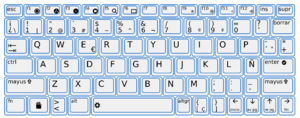
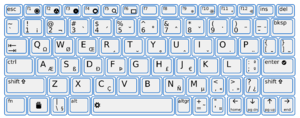
Misc.
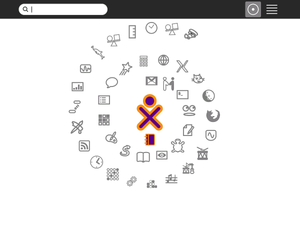
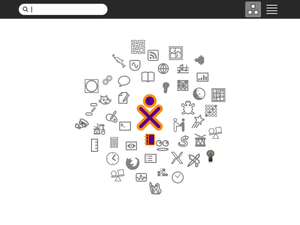
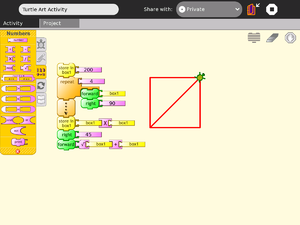
Floss Manual
<img src=" "/>
<style>
"/>
<style>
@import url("http://en.flossmanuals.net/bookstore/bookstore.css");
</style>
<script src="http://en.flossmanuals.net/bookstore/bookstore.js" type="text/javascript"></script> <script type="text/javascript"> FM.init({"paging":true,"preferred":["OLPC LAPTOP USERS GUIDE","SUGAR USERS GUIDE"]}); </script>
Portfolio
I am making a "TurtleArt: inspired portfolio tool. See TAPortfolio for more details.
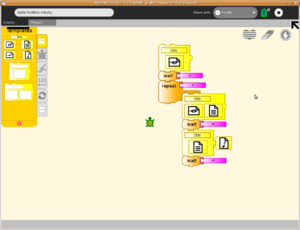
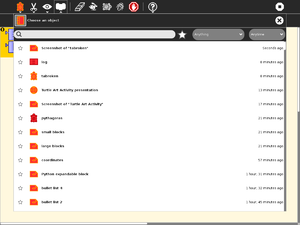
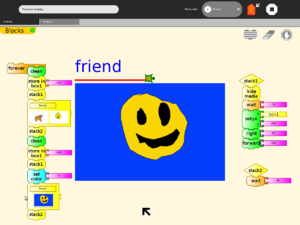
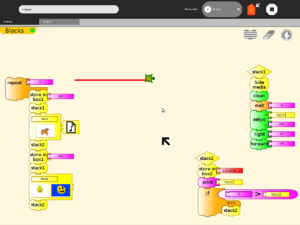
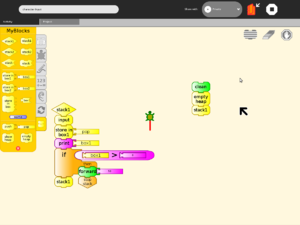
Turtle Art → Logo
I added a "view source" for Turtle Art that exports Logo.
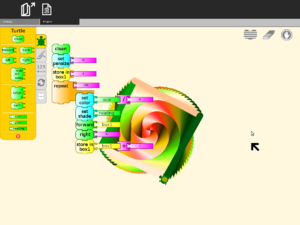
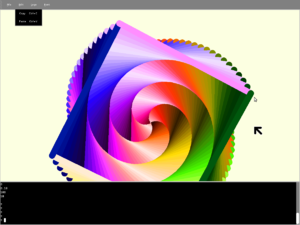
Some procedures for setting up the palette and the shade functionality:
to tasetpalette :i :r :g :b :myshade make "s ((:myshade - 50) / 50) ifelse lessp :s 0 [ make "s (1 + (:s *0.8)) make "r (:r * :s) make "g (:g * :s) make "b (:b * :s) ] [ make "s (:s * 0.9) make "r (:r + ((100-:r) * :s)) make "g (:g + ((100-:g) * :s)) make "b (:b + ((100-:b) * :s)) ] setpalette :i (list :r :g :b) end
to rgb :myi :mycolors :myshade make "myr first :mycolors make "mycolors butfirst :mycolors make "myg first :mycolors make "mycolors butfirst :mycolors make "myb first :mycolors make "mycolors butfirst :mycolors tasetpalette :myi :myr :myg :myb :myshade output :mycolors end
to processcolor :mycolors :myshade if emptyp :mycolors [stop] make "i :i + 1 processcolor (rgb :i :mycolors :myshade) :myshade end
to tasetshade :shade make "myshade modulo :shade 200 if greaterp :myshade 99 [make "myshade (199-:myshade)] make "i 7 make "mycolors :colors processcolor :mycolors :myshade end
to tasetpencolor :c make "color modulo round :c 100 setpencolor :color + 8 end
make "colors [ 100 0 0 100 5 0 100 10 0 100 15 0 100 20 0 100 25 0 100 30 0 100 35 0 100 40 0 100 45 0 100 50 0 100 55 0 100 60 0 100 65 0 100 70 0 100 75 0 100 80 0 100 85 0 100 90 0 100 95 0 100 100 0 90 100 0 80 100 0 70 100 0 60 100 0 50 100 0 40 100 0 30 100 0 20 100 0 10 100 0 0 100 0 0 100 5 0 100 10 0 100 15 0 100 20 0 100 25 0 100 30 0 100 35 0 100 40 0 100 45 0 100 50 0 100 55 0 100 60 0 100 65 0 100 70 0 100 75 0 100 80 0 100 85 0 100 90 0 100 95 0 100 100 0 95 100 0 90 100 0 85 100 0 80 100 0 75 100 0 70 100 0 65 100 0 60 100 0 55 100 0 50 100 0 45 100 0 40 100 0 35 100 0 30 100 0 25 100 0 20 100 0 15 100 0 10 100 0 5 100 0 0 100 5 0 100 10 0 100 15 0 100 20 0 100 25 0 100 30 0 100 35 0 100 40 0 100 45 0 100 50 0 100 55 0 100 60 0 100 65 0 100 70 0 100 75 0 100 80 0 100 85 0 100 90 0 100 95 0 100 100 0 100 100 0 90 100 0 80 100 0 70 100 0 60 100 0 50 100 0 40 100 0 30 100 0 20 100 0 10] make "shade 50 tasetshade :shade
to tasetbackground :color :shade tasetshade :shade setbackground :color + 8 end
The project:
to ta clearscreen tasetbackground 21 100 setpensize 25.0 make "box1 0.0 repeat 300.0 [ tasetpencolor xcor / 6.0 tasetshade heading forward :box1 right 91.0 make "box1 :box1 + 1.0 ] end
ta
Turtle Art variables
Following the lead of Luis Michelena, I've added named blocks and stacks. I plan to add push and pop next, which should greatly expand the range of possible constructions.
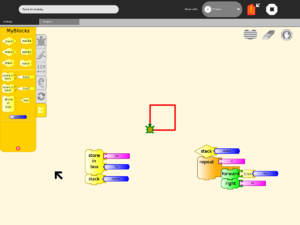
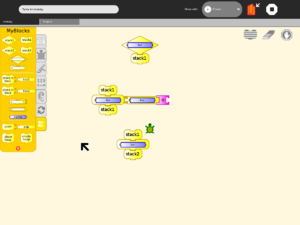
Turtle Art push and pop
While it is not the intent that Turtle Art be a full implementation of Logo, but there has been some discussion on teh Sur list about adding some capability for passing arguments to stacks. (and to support recursion). I have added a FILO and push and pop blocks to enable this functionality. I am looking for feedback. regarding this choice.
HBS-style analysis
- our points of difference
- our points of parity
- their points of difference
Sugar icons
| <imagemap>
File:Sugar-artwork.png rect 0 0 84 66 'activity-start'
rect 84 0 168 66 'activity-stop'
rect 168 0 252 66 'cell-format'
rect 252 0 336 66 'cell-height'
rect 336 0 420 66 'cell-size'
rect 420 0 504 66 'cell-width'
rect 504 0 588 66 'column-insert'
rect 588 0 672 66 'column-remove'
rect 672 0 756 66 'dialog-cancel'
rect 756 0 840 66 'dialog-ok'
rect 840 0 924 66 'document-save'
rect 924 0 1008 66 'document-send'
rect 1008 0 1092 66 'edit-copy'
rect 1092 0 1176 66 'edit-delete'
rect 1176 0 1260 66 'edit-paste'
rect 0 66 84 132 'edit-redo'
rect 84 66 168 132 'edit-undo'
rect 168 66 252 132 'format-columns-double'
rect 252 66 336 132 'format-columns-single'
rect 336 66 420 132 'format-columns-triple'
rect 420 66 504 132 'format-justify-center'
rect 504 66 588 132 'format-justify-fill'
rect 588 66 672 132 'format-justify-left'
rect 672 66 756 132 'format-justify-right'
rect 756 66 840 132 'format-text-bold'
rect 840 66 924 132 'format-text-italic'
rect 924 66 1008 132 'format-text-leading'
rect 1008 66 1092 132 'format-text-size'
rect 1092 66 1176 132 'format-text-underline'
rect 1176 66 1260 132 'go-down'
rect 0 132 84 198 'go-home'
rect 84 132 168 198 'go-left'
rect 168 132 252 198 'go-next-paired'
rect 252 132 336 198 'go-next'
rect 336 132 420 198 'go-previous-paired'
rect 420 132 504 198 'go-previous'
rect 504 132 588 198 'go-right'
rect 588 132 672 198 'go-up'
rect 672 132 756 198 'insert-image'
rect 756 132 840 198 'insert-table'
rect 840 132 924 198 'invite'
rect 924 132 1008 198 'list-add'
rect 1008 132 1092 198 'list-remove'
rect 1092 132 1176 198 'media-eject-insensitive'
rect 1176 132 1260 198 'media-eject'
rect 0 198 84 264 'media-playback-pause-insensitive'
rect 84 198 168 264 'media-playback-pause'
rect 168 198 252 264 'media-playback-start-insensitive'
rect 252 198 336 264 'media-playback-start'
rect 336 198 420 264 'media-playback-stop-insensitive'
rect 420 198 504 264 'media-playback-stop'
rect 504 198 588 264 'media-playlist-repeat-insensitive'
rect 588 198 672 264 'media-playlist-repeat'
rect 672 198 756 264 'media-playlist-shuffle-insensitive'
rect 756 198 840 264 'media-playlist-shuffle'
rect 840 198 924 264 'media-record-insensitive'
rect 924 198 1008 264 'media-record'
rect 1008 198 1092 264 'media-seek-backward-insensitive'
rect 1092 198 1176 264 'media-seek-backward'
rect 1176 198 1260 264 'media-seek-forward-insensitive'
rect 0 264 84 330 'media-seek-forward'
rect 84 264 168 330 'row-insert'
rect 168 264 252 330 'row-remove'
rect 252 264 336 330 'system-logout'
rect 336 264 420 330 'system-restart'
rect 420 264 504 330 'system-search'
rect 504 264 588 330 'system-shutdown'
rect 588 264 672 330 'toolbar-colors'
rect 672 264 756 330 'toolbar-edit'
rect 756 264 840 330 'toolbar-view'
rect 840 264 924 330 'transfer-from-application-octet-stream'
rect 924 264 1008 330 'transfer-from-audio-x-generic'
rect 1008 264 1092 330 'transfer-from-image-x-generic'
rect 1092 264 1176 330 'transfer-from'
rect 1176 264 1260 330 'transfer-from-text-uri-list'
rect 0 330 84 396 'transfer-from-text-x-generic'
rect 84 330 168 396 'transfer-from-video-x-generic'
rect 168 330 252 396 'transfer-to-application-octet-stream'
rect 252 330 336 396 'transfer-to-audio-x-generic'
rect 336 330 420 396 'transfer-to-image-x-generic'
rect 420 330 504 396 'transfer-to'
rect 504 330 588 396 'transfer-to-text-uri-list'
rect 588 330 672 396 'transfer-to-text-x-generic'
rect 672 330 756 396 'transfer-to-video-x-generic'
rect 756 330 840 396 'tray-hide'
rect 840 330 924 396 'tray-show'
rect 924 330 1008 396 'view-box'
rect 1008 330 1092 396 'view-created'
rect 1092 330 1176 396 'view-details'
rect 1176 330 1260 396 'view-freeform'
rect 0 396 84 462 'view-fullscreen'
rect 84 396 168 462 'view-lastedit'
rect 168 396 252 462 'view-list'
rect 252 396 336 462 'view-radial'
rect 336 396 420 462 'view-refresh'
rect 420 396 504 462 'view-return'
rect 504 396 588 462 'view-size'
rect 588 396 672 462 'view-source'
rect 672 396 756 462 'view-spiral'
rect 756 396 840 462 'view-triangle'
rect 840 396 924 462 'zoom-activity'
rect 924 396 1008 462 'zoom-best-fit'
rect 1008 396 1092 462 'zoom-groups'
rect 1092 396 1176 462 'zoom-home'
rect 1176 396 1260 462 'zoom-in'
rect 0 462 84 528 'zoom-neighborhood'
rect 84 462 168 528 'zoom-original'
rect 168 462 252 528 'zoom-out'
desc none
</imagemap>
|

























